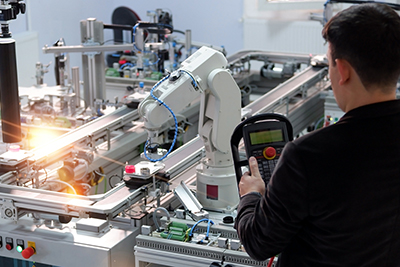Appliance Manufacturers Are Looking to Robots to Boost Productivity
Appliance Manufacturers Are Turning to Robots to Boost Productivity

More and more consumers are embracing the idea of robots helping to increase efficiency in their homes. Devices like robotic pool cleaners, smart mowers, and automated vacuum systems are giving people more time for leisure and personal tasks. Even traditional appliances such as dishwashers and washing machines now come with advanced settings that allow for hands-free operation.
Despite the growing demand for automation in home appliances, many manufacturing facilities still rely heavily on manual labor. As companies face rising pressure to produce faster and more efficiently, they are increasingly turning to robotic automation to improve productivity and meet market demands.
The Advantages of Robotic Manufacturing in the Appliance Industry
Appliance manufacturing has become more complex over the years, but the need for consistency and precision remains crucial. Here are three key benefits of integrating robotics into the production process:
1. Efficient Execution of Repetitive Tasks
While appliance designs may vary, the core assembly process is often repetitive and standardized. Robots excel at performing these tasks quickly and accurately, reducing the risk of errors and improving overall output speed.
2. Precision and Consistency in Production
Robots can assemble products with exacting standards, ensuring quality control and compliance with industry regulations. Unlike human workers, who may make mistakes due to fatigue or oversight, robots maintain a high level of accuracy throughout the entire production cycle.
3. Cost-Effective Long-Term Solution
Although the initial investment in robotic systems can be significant, the long-term savings in labor costs and increased efficiency make it a smart move for manufacturers. Additionally, modern robots can work alongside humans, enhancing productivity without fully replacing the workforce.
Robotics is Transforming Multiple Industries Beyond Appliances
Robotics isn't just revolutionizing the appliance industry—it's also making waves in other sectors. In consumer electronics, robots are used to assemble smartphones with incredible precision. Retailers are using them in warehouses to sort and pick items for online orders. In agriculture, robotic systems help manage crops by monitoring soil conditions and applying water and nutrients efficiently.
As technology continues to evolve, the integration of robotics into manufacturing is becoming more widespread. Companies like Genesis Systems are leading the way, offering tailored automation solutions that drive growth and innovation across light industrial markets.
Posted in Uncategorizedmold steel,mold steel,car mold steel,auto mold steel
Jiangyou ChongxinSpecial Metal Materials Co., Ltd. , https://www.zhongxindiesteel.com